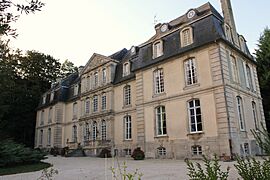Airan facts for kids
Quick facts for kids
Airan
|
|
|---|---|
|
Part of Valambray
|
|

Chateau of Coupigny
|
|
| Country | France |
| Region | Normandy |
| Department | Calvados |
| Arrondissement | Caen |
| Canton | Troarn |
| Commune | Valambray |
| Area
1
|
13.5 km2 (5.2 sq mi) |
| Population
(2021)
|
648 |
| • Density | 48.00/km2 (124.3/sq mi) |
| Time zone | UTC+01:00 (CET) |
| • Summer (DST) | UTC+02:00 (CEST) |
| Postal code |
14370
|
| Elevation | 22–64 m (72–210 ft) (avg. 30 m or 98 ft) |
| 1 French Land Register data, which excludes lakes, ponds, glaciers > 1 km2 (0.386 sq mi or 247 acres) and river estuaries. | |
Airan is a former small town, also called a commune, located in the Calvados area of Normandy, a region in northwestern France. On January 1, 2017, Airan joined with other nearby towns to form a new, larger commune called Valambray.
Contents
Where is Airan Located?
Airan is found about 17 kilometers (about 10.5 miles) southeast of a bigger city called Caen. It's also about 25 kilometers (about 15.5 miles) east of Lisieux. You can get to Airan by several roads, like the D40 or the D47, which connect it to other villages.
The area around Airan is mostly farmland, with a few small patches of forest. Besides the main village, there are also smaller groups of houses called hamlets, such as Le Haute-des-Pedouzes and Coupigny.
Two small rivers, the Muance and the Douet, flow near Airan. The Muance river forms part of the western edge of the town. The Douet river starts in the north and flows northwards. Both rivers eventually join the larger Dives river.
 |
Moult | Argences | Méry-Corbon |  |
| Chicheboville | Magny-le-Freule | |||
| Billy | Vieux-Fumé | Cesny-aux-Vignes |
What Does the Name Airan Mean?
The name Airan comes from an old Germanic language. It might have come from a personal name like Heidrammus. This type of name origin is quite rare in this part of France.
A Look Back: Airan's History
People have lived in the Airan area for a very long time. Archaeologists have found ancient burial sites from the Merovingian period, which was a long time ago, around the 5th to 8th centuries. There's also an old story about a famous "Treasure of Airan," though its exact location is a mystery!
During World War II, in 1942, the French Resistance group carried out two important actions in Airan. They caused two train derailments (when a train goes off its tracks). These events were part of the Resistance's efforts against the occupation. After these events, there were difficult times for many local people.
Who Governed Airan?
Airan, like any town, had mayors who helped run things. Here is a list of some of the people who served as mayor:
| From | To | Name | Role |
|---|---|---|---|
| 1850 | 1862 | M. Borgarelli d'Ison | Colonel (retired) |
| 1862 | 1869 | Jules Alfred Le Tourneur du Coudray | Secretary for the Minister of Finance |
| 1966 | 1989 | Maurice Lecoq | Market gardener |
| 1989 | 2008 | Michel Deuzet | Farmer |
| 2008 | 2017 | Patrice Martin | Bank Officer |
How Many People Live in Airan?
The people who live in Airan are called Airannais (for boys and men) or Airannaises (for girls and women). The number of people living in Airan has changed over the years:
| Historical population | ||
|---|---|---|
| Year | Pop. | ±% p.a. |
| 2006 | 594 | — |
| 2011 | 688 | +2.98% |
| 2021 | 648 | −0.60% |
| Source: INSEE | ||
Airan's Special Buildings and History
Old Buildings and Structures
Airan has several interesting old buildings that are protected as historical monuments. This means they are very important and are kept safe for future generations to see. Some of these include:
- A Water Mill built in 1682. This mill is a great example of the old buildings found in the Caen region.
- The Chateau of Coupigny, a large old castle-like house from the 18th century.
- The Chateau of Coupigny Park, the beautiful gardens and grounds around the Chateau.
Churches and Religious Sites
There are also important religious buildings in Airan that are considered historical monuments:
- The Church of Saint Germain was built in the 12th century. It has a special front part, called a facade, built in the Romanesque style, which is an old type of architecture.
Picture Gallery
-
The Lavoir (Public laundry) on the Muance river
See also
 In Spanish: Airan para niños
In Spanish: Airan para niños
 | May Edward Chinn |
 | Rebecca Cole |
 | Alexa Canady |
 | Dorothy Lavinia Brown |









